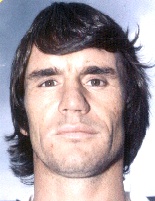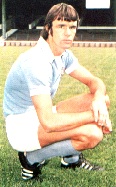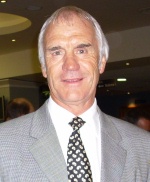
Dave Watson
Born Stapleford; October 5, 1946
At first glance the career of Dave Watson doesn’t look that unusual. It might appear that the only thing distinguishing Watson from the thousands of other stopper centre halves to have played league football is that he was a lot better than almost all of them. Watson’s story is surely a unique one, however.
How many other players can you name who made their league debut at the age of 20, didn’t play in the top flight until they were just a couple of months short of their 29th birthday and still managed to win 65 England caps?
The problem for the man who would come to be known as “Big Dave Watson” wherever he went was that, as a youngster, he was not very big at all. Standing little over five feet tall when he left school the possibility of becoming a professional footballer seemed incredible. Instead Watson took up employment as a farm labourer before becoming an apprentice electrician.
Dave Watson loved his football, however, and as he began to shoot up he quickly became a noted player in Nottinghamshire amateur circles. So much so that when he was made redundant from his electrician training he was ready to go to Notts County for a trial and was instantly signed on by the struggling fourth division club.
Having made a handful of appearances for the Meadow Lane club during the 1966-67 season Watson established himself in the first team the following season and quickly drew interest from other clubs with his commanding performances at centre half.
He scored his only goal for County, in this first spell, in a 1-0 victory over Crewe Alexandra but would be allowed to leave for Rotherham United around the turn of the year.
The Millers’ boss at the time was Tommy Docherty and it is unlikely that “The Doc” ever did a better bit of business as he did when stealing Watson from Meadow Lane. To secure his services Docherty handed over £1,000 cash and threw in the winger Keith Pring into the bargain.
Watson was plunged into a second division relegation battle at Millmoor which would prove unsuccessful. With relegation Docherty upped and left but his admiration for Watson remained strong. At both Queens Park Rangers and Aston Villa he would try to sign him but Rotherham were in no mood to do their former boss any favours and Watson stayed put.
Big Dave Watson shows you where he wants it.
 Dave Watson was a strong, capable defender at Millmoor but the club alternated between using him at centre half and at centre forward and this probably hindered his development as a player. Particularly useful in the air Watson was a decent forward and it was in this role that he captured the attention of Sunderland manager Alan Brown at the start of the 1970-71 season.
Dave Watson was a strong, capable defender at Millmoor but the club alternated between using him at centre half and at centre forward and this probably hindered his development as a player. Particularly useful in the air Watson was a decent forward and it was in this role that he captured the attention of Sunderland manager Alan Brown at the start of the 1970-71 season.
An early burst of goalscoring form, including a hat trick in a 5-1 win over Rochdale, convinced Brown that Watson was the man he wanted to boost fortunes at Roker Park and Rotherham were persuaded to part with their prized asset for £100,000.
On capturing his man Brown declared “I’ve never been so happy since the day I signed Charlie Hurley” but his failure to recognise that Watson’s real strength was as a defender contributed to his ultimate failure to lead Sunderland back into the first division.
Again Watson was switched between defence and attack during his first two seasons at Roker Park and Sunderland failed to put together a genuine promotion bid.
It was Brown’s successor Bob Stokoe who switched Watson permanently to centre half and the move was instrumental to the club enjoying one of its’ greatest triumphs. Although Sunderland were again unable to sustain a promotion challenge during the 1972-73 season they did embark on a thrilling FA Cup run and Watson would be a crucial figure throughout.
Stokoe was perhaps fortunate that Dave Watson started the season in poor form. Playing up front in the early stages of the campaign Watson was singularly unable to find the net. This probably made the managers’ decision to move him into the back four a straightforward one but it was a move that suited player and club equally.
By now a truly dominant stopper who was also quick across the ground Watson immediately showed himself to be an outstanding centre half and he raised his game to new heights during the clubs’ cup run.
The third round saw Watson returning to his former club Notts County and, against a much improved side, an early exit was on the cards as Sunderland trailed by the only goal with ten minutes remaining. Watson saved the day with a headed equaliser and was also on target with the first goal as Sunderland won the replay 2-0 at Roker Park.
The fourth round then saw Sunderland lucky to scrape a 1-1 draw at home to Reading but Dave Watson again gave them the lead in the replay which ended in a comfortable 3-1 win for the Wearsiders.
There was nothing in these performances to suggest that Sunderland were real contenders for the cup but they stepped up several gears in the next round to earn a 2-2 draw away at Manchester City and then turned on a brilliant display to win the replay 3-1 at a heaving Roker Park with Watson absolutely outstanding at the back.
Given a favourable draw in the quarter finals Sunderland eased into the last four with a 2-0 win over Luton Town with Watson again opening the scoring. Suddenly Wembley was a genuine prospect and Sunderland upset the odds to reach the final with a memorable 2-1 victory over Arsenal at Hillsborough.
It was generally thought that Sunderland had achieved all they could by making the final and the mighty Leeds United side they faced went into the final possibly the strongest favourites in the history of the competition.
The result of that game is, of course, now history with Ian Porterfield’s goal, Jim Montgomery’s save and Bob Stokoe’s raincoat, hat and silly dance the stuff of legends. Generally forgotten, however, is the man of the match display given by Dave Watson who subdued the feared Leeds’ strike pairing of Allan Clarke and Mick Jones almost totally.
Completely dominant in the air and showing himself capable of matching the slippery Clarke for pace and skill Watson’s performance was one of complete maturity and showed that Sunderland possessed an important talent. “He was outstanding” Stokoe declared afterwards. “Like a rock in the middle of our defence.”
Of course such displays, which had become a regular occurrence, alerted the first division managers and speculation regarding Watson’s future became a common thing. Believing that Sunderland would win promotion to the first division themselves and with a European campaign to look forward to, Watson stayed at Roker Park but somehow the expected move upwards didn’t happen.
Perhaps distracted by Europe the club never got their promotion bid going the following season and fell at the second hurdle in the Cup Winners Cup. Having disposed of Vasas Budapest in the 1st round Sunderland were knocked out by Sporting Lisbon on a 3-2 aggregate in the 2nd.
Division Two was an unusually exciting place to be the following year with Manchester United dropping down for a year to join other giants Sunderland and Aston Villa. These three teams were the major players in the promotion race all along with Norwich City also challenging.
Sunderland were well placed at half way but suffered an inconsistent second part of the season and left themselves vulnerable to Villa and Norwich who trailed them all the way but had games in hand having both reached the final of the League Cup.
Sunderland suffered a damaging defeat at Oxford United three games from the end of the season and when they lost 2-0 at Aston Villa in their final match they were condemned to another season outside the top flight.
 Now pushing 29 this was one failure too many for Dave Watson who finally moved into the first division when Manchester City handed over £175,000 cash and sent Jeff Clarke in the opposite direction as part of the deal.
Now pushing 29 this was one failure too many for Dave Watson who finally moved into the first division when Manchester City handed over £175,000 cash and sent Jeff Clarke in the opposite direction as part of the deal.
There was no hint of a gamble in the signing. As well as churning out performances week in and week out for Sunderland Watson had by now established himself in the England set up despite having yet to play in the first division.
Dave Watson’s first cap, along with five other debutants, had come in a goalless draw in Portugal in April 1974. Alongside Colin Todd he had produced a commanding display in what proved to be Alf Ramsey’s last game in charge.
It was during the same summer that Watson really established himself as an England player during a tour of Eastern Europe under caretaker boss Joe Mercer. Watson was outstanding in three gruelling games against East Germany, Bulgaria and Yugoslavia which brought two draws and a victory and his partnership with the cultured Todd looked a natural combination.
For some reason Todd did not seem to really suit the next full time manager, Don Revie, but the imposing Watson certainly did and he would remain a regular for the next five years.
Everything looked set fair for Watson to enjoy a glorious end to his career with club and country but somehow this never quite happened, though certainly by no fault of his own. Watson continued to give magnificent service for City and England but his four years at Maine Road were generally frustrating.
The highlight at club level came in Watson’s first season with City as they claimed victory in the League Cup. Watson starred in one of City’s greatest ever victories, a 4-0 thrashing of rivals United, along the way and played his part in the 2-1 defeat of Newcastle at Wembley which brought them the trophy.
The following year Dave Watson was named the clubs’ Player of the Year as City finished runners up behind Liverpool in the league but they could only manage 4th place the year after and suffered frustrating defeats in Europe to Juventus, Widzew Lodz and Borussia Moenchengladbach in their European campaigns.
At international level Watson suffered as England missed out on qualification for two major competitions. They were knocked out of the 1976 European Championships by the eventual winners Czechoslovakia and lost out on goal difference to Italy in their World Cup qualifying group two years later.
Watson actually missed the crucial defeat against Italy in Rome, a rare event, but was by now the lynchpin of the England defence. With Todd mysteriously overlooked and Kevin Beattie invariably injured Watson’s dominance was vital alongside players like Emlyn Hughes and Brian Greenhoff who were scarcely convincing as international centre halves.
Now well into his thirties, Dave Watson looked a good bet to continue at the heart of both the City and England defences for some years to come. His previous boss Bob Stokoe had described him as “the perfect professional, a natural athlete who looks after himself and is dedicated to the game.”
The records back this statement up. In 1974 Watson’s weight was recorded as 11’ 7 and in 1984 the scales were still apparently giving out the same numbers. Something was about to disturb Watson’s equilibrium, however.
That something was a someone. That someone was Malcolm Allison. Always the extrovert Allison breezed back into Maine Road to take over from Tony Book and immediately decided that an ageing playing squad needed a severe overhaul.
As a set of revolving doors were fixed to the entrance of Maine Road there was a steady stream of players coming and going. One of the casualties was Watson. Allison had tried to do too much too soon and probably his biggest error was in letting Watson, still palpably at the top of his game, go. The manager declared that his replacement, Dejan Stepanovic, was an improvement on the man leaving but subsequent events made a nonsense of that opinion and Allison’s judgement in many other areas was found to be wanting as City slumped dramatically.
In Dave Watson’s case the club appeared to know they were taking a massive gamble as they refused to allow him to leave for another English club. This stance led to Watson moving to Germany for a spell with Werder Bremen. This move could be described as unhappy, eventful and brief. Within months Watson was back in England after being sent off in his second game for the club for “pushing” an opponent, banned for eight weeks, fined by his club and the German FA and refusing to travel for game against Schalke because of injury before then reporting for international duty with England.
All this ended with Watson getting what he presumably wanted, a £200,000 move back to England and Southampton.
Watson’s new beginning at the Dell got off to an unhappy start with a 4-0 defeat at West Brom but this particular collection of golden oldies soon found their feet to register finishes of 8th and 6th during Watson’s two full seasons with the club.
There were several memorable performances and Watson no doubt enjoyed scoring in a 4-1 drubbing of Man City. He also found the net as European champions Nottingham Forest were routed by the same scoreline at the Dell.
Dave Watson also found his goalscoring touch at international level during 1979 as he notched all four of his England goals during the calendar year. Having scored in separate games against Northern Ireland he then repeated the trick against Bulgaria as England secured qualification for the finals of the 1980 European Championships.
Watson, by now enjoying a more capable partner in Liverpool’s Phil Thompson, was as solid as ever during these finals but England narrowly missed out in the group stages. Having only managed a draw against a better than expected Belgium side they lost by the only goal to host nation Italy before winning their final game against Spain 2-1.
As the 1982 World Cup finals approached, however, Watson suddenly found his position at both club and international level under serious threat. England were malfunctioning badly as they stumbled towards their eventual qualification and Watson was singled out for criticism after making mistakes in the defeats against Rumania and Switzerland.
The centre half was then dropped by his club early on in the 1981-82 season and his position in the top flight, never mind international level, looked in serious danger.
 Watson was offered the chance of first team football by Stoke City in January 1982 as the Potteries club faced a relegation battle. In his first game back Watson showed no rustiness as he performed with distinction against his old club City and his expert handling of Trevor Francis was a major factor behind Stoke’s 1-1 draw at Maine Road.
Watson was offered the chance of first team football by Stoke City in January 1982 as the Potteries club faced a relegation battle. In his first game back Watson showed no rustiness as he performed with distinction against his old club City and his expert handling of Trevor Francis was a major factor behind Stoke’s 1-1 draw at Maine Road.
Watson also chipped in with three goals as Stoke beat the drop and his form also earned a recall into the England squad with the World Cup finals now just around the corner. He was used with Steve Foster as a man marker with Ray Wilkins sweeping up behind in a 4-0 victory over Northern Ireland and was given another start against Iceland in the immediate run up to the finals in Spain.
Ultimately, however, there would be heartbreak for Dave Watson as Ron Greenwood opted for Steve Foster as his third centre back in the final squad.
This left Watson with a tally of 65 caps and the hardly wished for distinction of being England’s most capped player never to appear in a World Cup finals.
Now 36, that’s Watson’s age not a collection of pop tunes, the veteran centre half enjoyed another excellent season with Stoke who looked like genuine candidates for a European place for much of the season before eventually finishing 13th and then jetted out to the States for a summer of football with Vancouver Whitecaps, who I suppose are actually Canadians.
Watson’s performances across the pond landed him with the title of Best Defender in the North American Soccer League but his age was finally catching up with him.
Back in England Watson moved to Derby County, by now in the second division, and was unable to stop them suffering a glum relegation into Division Three. After another summer playing in North America with Fort Lauderdale he then returned to England to suffer another relegation from Division Two, this time with his first club Notts County.
This would be Watson’s last season in the Football League although he did also play for Kettering Town in the non league circles.
Although Watson’s career was not littered with glory it was one of unstinting consistency and excellence. Watson was the stereotypical English stopper, strong, commanding in the air, tough tackling, no nonsense and basically very scary.
He was undoubtedly vastly superior to the ordinary centre half, however. Quick across the ground, quick turning and an excellent reader of the game who could play a bit when appropriate Watson was a good footballer who was, and remains, probably underrated.
There is no doubt that his biggest asset was his heading ability, however, and the image of him climbing into an aerial duel with neck muscles straining and the ball being thumped clear somewhere into the distance is the one most people will conjure when they think of Dave Watson.
 The timing and athleticism were the things that gave Watson this great ability in the air and made him the hugely commanding figure he always appeared for the statistics show that “Big” Dave Watson was not actually all that big at all.
The timing and athleticism were the things that gave Watson this great ability in the air and made him the hugely commanding figure he always appeared for the statistics show that “Big” Dave Watson was not actually all that big at all.
Standing half an inch short of six feet tall did not exactly make Watson a giant but that is how he looked on a football field and his presence as well as his ability combined to make him one of the very best English defenders of his generation.
Dave Watson’s Career Statistics
CLUB GAMES GOALS
Notts County 25 1
Rotherham Utd 121 19
Sunderland 177 27
Manchester City 146 4
Southampton 73 7
Stoke City 59 5
Derby County 34 1
Notts County 25 1
England 65 4
TOTAL 724 69

Great article. Dave Watson was slightly before my time, and he was one of these players, like Asa Hartford for my country, Scotland, who picked up a lot of caps so would appear to have been an important player, yet barely got a mention after the early 80s.
Watson had a kind of cool 70s look with the hair and “hard” look, and sounds like he could certainly play – the kind of player I’d want in my team.